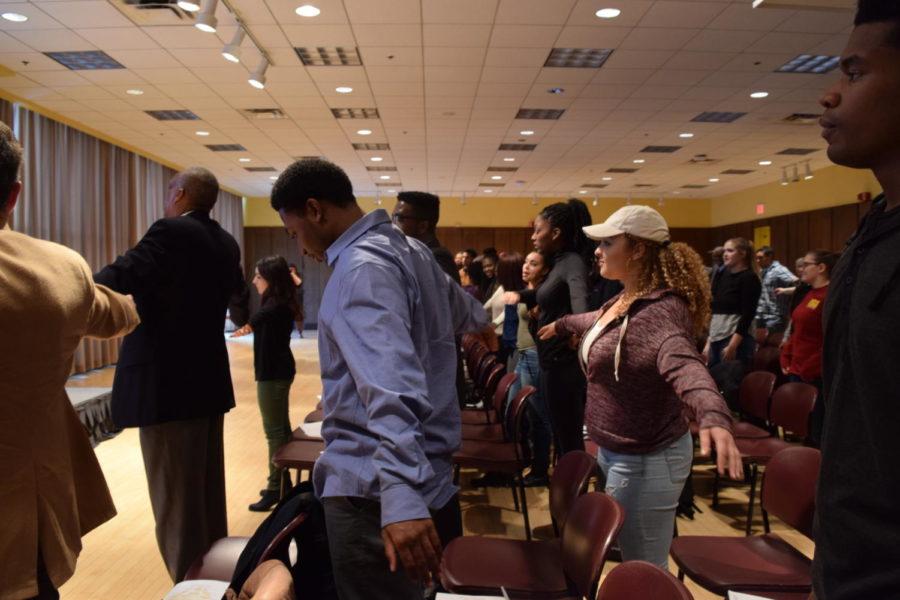Students, staff awarded at MLK ceremony
Students spread their arms to show that they are all in reach of a cause. Alisha Gordon, keynote speaker, discussed societal change during the annual 2016 MLK Legacy Convocation.
January 22, 2016
Words have the ability to be one of the most powerful, inspiring and haunting forms of communication.
Alisha Gordon, a Georgia woman of many talents ranging from writer to activist to theologian, travels globally to touch on the intersections of humanity.
Gordon, who was the keynote speaker at the annual Dr. Martin Luther King, Jr. Legacy Convocation, spoke of what she introduced as “The Fierce Urgency of Now.”
Walking up to the stage, Gordon broke out into song, “We’re gonna keep on a walkin’, keep on a talkin’, marchin’ up to freedom’s land.”
Beginning her speech with a segment of King’s “I Have a Dream” speech, Gordon spoke on the gnawing feeling in a sense of urgency, and what it means for America today, and want it meant for America in the past.
“Our heads pound, our stomachs ache, all signals that there is something requiring swift and persistent action,” Gordon said.
Gordon then brought forth a timeline, one that highlighted the gaps within societal change.
“There was a 58-year gap between Plessy v. Ferguson, the law that said everything was separate but equal, and the Brown v. Board decision in 1954, 58 years,” Gordon said.
The Brown v. Board of Education ruling was the precedent that ended legal segregation in schools. Gordon then mentioned a nine-year gap between that and when the first southern schools would begin to desegregate.
From there, it would be 30 years before some cities in the Northeast and Pacific Northwest would bus inner-city children into predominantly white schools after the Civil Rights Act of 1964.
“When the systems of injustice work in your favor, time is of little concern. What’s 58 years? You finally got it, right?” Gordon asked. “But when these systems work against you, time means everything.”
Then speaking in regards of King’s life, Gordon said that even he didn’t know he would become who he was, until he was thrust into the life of activism.
She said that you might not actually see the work you have done in your lifetime, but we, as a society, have to accept to see change now.
“Time passes, but the urgency for change has always been here,” Gordon said. She then asked, “Is yesterday’s movement today’s movement?” begging the question, what are millennials fighting for?
She answered this by suggesting that to make a change, one must dismantle the system.
“The civil rights movement did not offer an exchange of power,” Gordon said. “Power that gives minority groups the ability to change and dismantle the structures that made discriminatory practices against all people possible. Yes, I can enter through the front door, but what happens when I’m ready to apply for a job?”
Gordon then offered two ways to make a change in the system possible. She said to first “stay in motion,” and to secondly “use what you got.”
She asked members in the audience to find their role in change and asked what causes are in their immediate reach.
“You can change the world around you,” Gordon said. “You can change the world that’s right within your reach.”
The program agenda also included words from Kenyatta Shamburger, director of multicultural affairs, Daniel Breitbarth, Student Government president, Reginald Stewart, vice president for diversity and inclusion, and Chrishelda Green, senior in child, adult and family services.
Stewart handed out the 2016 Martin Luther King, Jr. Advancing One Community Awards to Jazmin Murguia, senior in journalism and mass communication; Dianne Bystrom, director of the Carrie Chapman Catt Center for Women and Politics; and to the Black Student Organization.
“Our honorees have demonstrated tireless commitment to the principles and goals of Dr. King through their actions,” Stewart said. “They have worked to bring about change at Iowa State University, present company included. If you question that, I am here because of the work you have done.”







